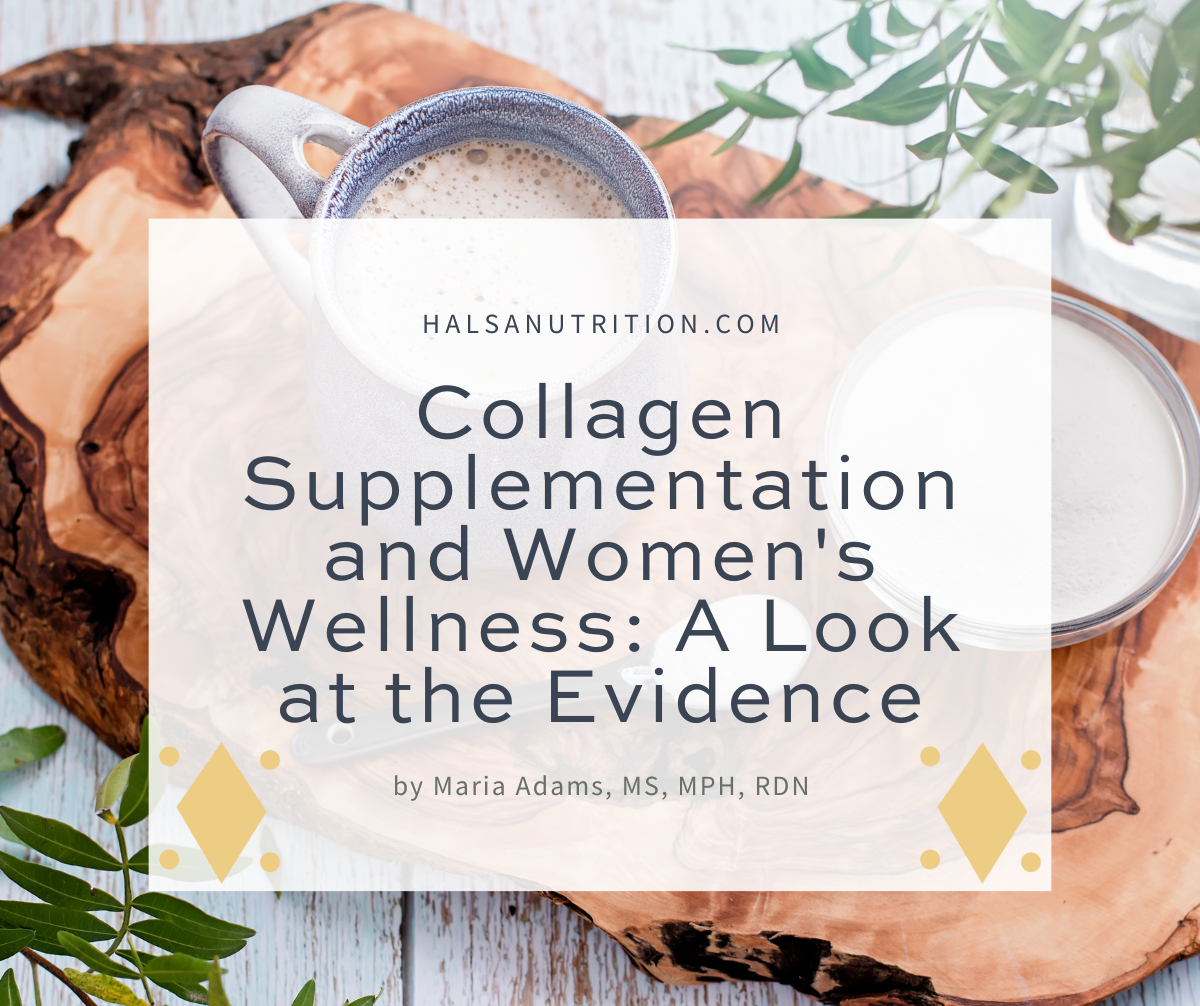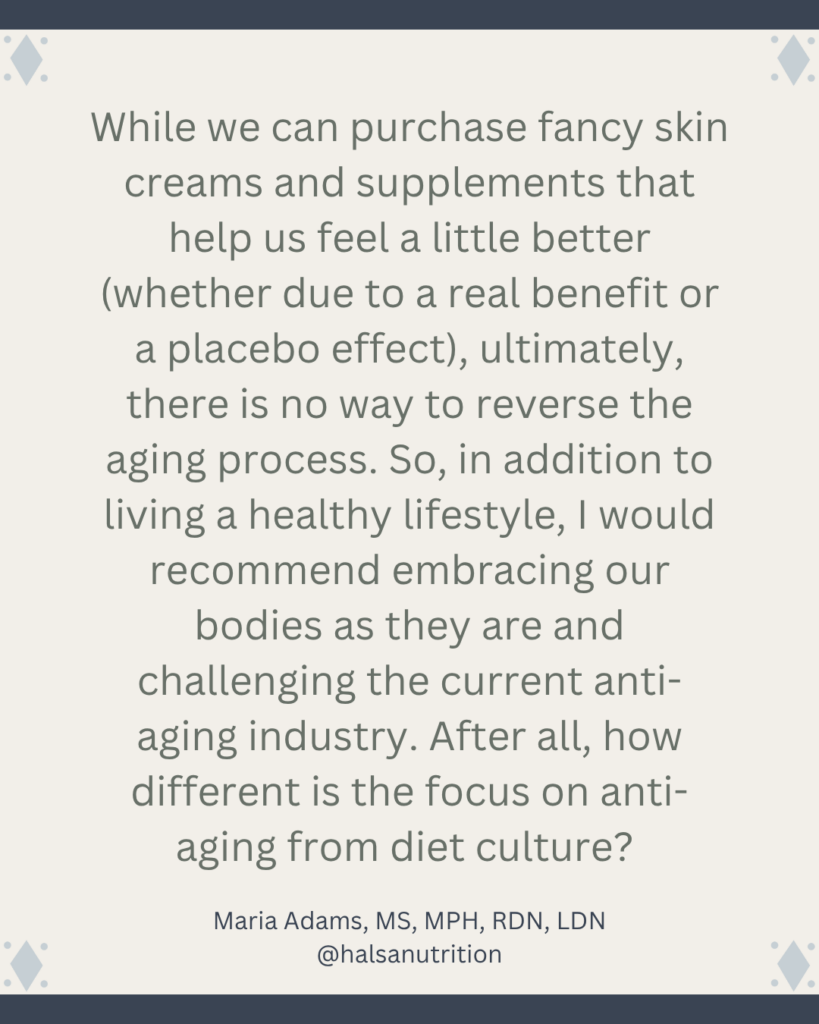
Collagen Supplementation and Women’s Wellness: A Look at the Evidence
Estimated reading time: 8 minutes
In recent years, collagen supplements have become increasingly prevalent on store shelves. Social media accounts related to women’s wellness also promote the benefits of collagen supplementation, promising everything from more youthful-looking skin to improved joint health and other benefits. But does the evidence for collagen supplementation live up to the hype? Let’s take a look at the evidence.
What is collagen?
Collagen is the most abundant protein in the body. It’s made up of amino acids and has a rigid, strength-providing structure that comprises connective tissue, including tendons, ligaments, and bones. It’s present in muscle tissue, the digestive tract, blood vessels, kidneys, heart, bladder, hair, and nails. Collagen helps keep skin firm and elastic; many experts refer to it as “the glue that holds everything together.”
There are about 4 or 5 different types of collagen in supplements. Type I and III are considered best for skin, while type II targets joints.
Why is collagen important for women?
Collagen is essential for people of all ages. As we age, collagen production slows. This can result in sagging skin, wrinkles, more rigid ligaments, and stiffer joints.
During midlife, women are also susceptible to hormone-related changes that can further impact these issues. Women experience a significant reduction in collagen production post-menopause, leading to an increased likelihood of joint pain and sagging skin. In addition, due to declining estrogen levels, bone loss also accelerates post-menopause.
Recent research has examined the effects of taking collagen supplements on improving age-related changes in joints, skin, and bones.

1. Joint health
There is substantial research suggesting a correlation between collagen supplementation and improved joint health. A 2021 review study found strong evidence that 15 grams of daily collagen peptide supplementation could improve joint pain and functionality. Another 2019 review study found that collagen is effective at reducing osteoarthritis symptoms.
2. Skin health
Studies show that women’s skin loses 30% of collagen during the first five years after they reach menopause. After that, the decline continues at about 2% per year for 20 years. A 2021 review study found that taking collagen supplements for 90 days improved skin appearance by reducing wrinkles and increasing skin elasticity and hydration. However, a Harvard article points out that it’s unclear whether these benefits were due to collagen or something else. A 2023 review study found that collagen supplementation improved skin elasticity and hydration.
3. Bone health
Bone loss typically begins by our 30s and is accelerated for women after they reach menopause. This can weaken bones and lead to osteoporosis, which increases the risk of bone fractures. A 2018 randomized, controlled trial found that collagen supplementation improved bone mineral density in post-menopausal women. A 2020 study found that taking collagen supplements plus calcium and vitamin D led to favorable effects on bone health in post menopausal women with low bone density.
Natural food sources of collagen
Our bodies naturally produce collagen from the food we eat. Protein-rich foods, such as chicken, fish, chickpeas, and nuts, are all beneficial. The body breaks down any food with protein into individual amino acids. Once absorbed, these amino acids will be sent where they are needed in your body. This means there is no guarantee that the collagen supplements you ingest will go where you want them.
Bone broth, a broth made from simmering water, vegetables, and bones for up to 24 hours, also has collagen. However, the actual amounts may vary, and studies suggest that commercial bone broth is unlikely to provide reliable amounts of collagen compared to collagen supplements.
Foods high in vitamin C, copper, and zinc help support collagen production. So, whether you are supplementing with collagen or relying on getting collagen from food, it’s important to eat a variety of nutrient-rich foods to support this process.
- Vitamin C-rich foods include kiwi, strawberries, red bell peppers, broccoli, and potatoes.
- Copper sources include oysters, shellfish, cashews, pumpkin seeds, and sunflower seeds.
- Zinc sources include chicken, clams, red meat, poultry, pork, chickpeas, nuts, and whole grains.
Note: In general, getting your vitamins and minerals from foods is better than getting them from supplements.
Collagen supplements
Collagen supplements, commonly referred to as collagen peptides, are available in pill, liquid, and powder forms. They consist of collagen extracted from animals, including beef, fish, and chicken. Specifically, the collagen comes from the bones, skin, and cartilage of these animals. Products will specify where their collagen comes from; for example, if you are a pescetarian, you can choose a product made from fish.
If you decide to try supplementation, opt for collagen supplements that undergo third-party testing. Also, skip the food and drink products with added collagen; these functional foods are profiting from the collagen trend, but their efficacy hasn’t been well studied. Hydrolyzed collagen supplements are generally considered the most effective.
Here is a look at the pros and cons of collagen supplementation:
Pros of collagen supplementation
- An easy way to boost collagen intake.
- Adds protein to your diet.
- Studies show that they may help improve skin elasticity and alleviate symptoms of osteoarthritis.
- Minimal side effects reported.
- A less invasive option than injecting fillers into the face to reduce wrinkles or having surgery for osteoarthritis.
Cons of collagen supplementation
- Taste. While “easy” to add to coffee or smoothies, collagen does affect the taste.
- Cost. Expensive if you are going to take them every day as recommended; it would be cheaper to get collagen from real food.
- Sustainability of the habit. It may be challenging to incorporate collagen consistently into your daily routine due to factors such as taste, remembering to add it, and the cost.
- Effectiveness not guaranteed. More research is needed to determine whether they are effective for different groups of people. We also don’t know for sure how long it takes to see benefits.
- Not vegetarian. If you are a vegetarian, understand that collagen is derived from animal products.
- Quality of product not guaranteed. The FDA doesn’t regulate supplements, so the quality of the product you purchase is not guaranteed. Seek out a product from a reputable brand and buy in-store instead of online. Here is a collagen product analysis by Consumer Lab, an independent organization that tests and reviews supplements.
- More research is needed. While there is a growing body of evidence supporting collagen, it’s important to note that many of the studies were funded by companies that produce collagen supplements. Moreover, larger and longer-term studies are needed.
Other ways to maximize collagen production naturally
In addition to eating a diet with a variety of protein sources and foods rich in vitamin C, copper, and zinc, other ways to reduce collagen loss include not smoking, getting enough sleep, being sun smart, limiting alcohol intake, and eating a diet rich in antioxidants (think fruits, veggies, nuts, seeds, whole grains, coffee, green tea, and dark chocolate).
Exercise has also been shown to improve skin elasticity and will, of course, give you that healthy glow too. Moreover, exercise enhances joint function in people with osteoarthritis by increasing mobility, reducing stiffness, and improving muscle strength and flexibility.

Bottom line on collagen supplementation and women’s well-being
It’s energizing and life-affirming to want to do what we can to feel our best throughout life. Numerous studies have found health benefits for women who regularly take collagen supplements. If you have joint discomfort due to osteoarthritis, daily collagen supplementation may help. If aging skin is a concern, collagen supplementation may help and could be a less invasive alternative than other options.
Of course, taking collagen supplements does not guarantee improved well-being. And with the cost and implementation challenges that come with taking them, this may be a dealbreaker for many. It’s essential to remember that these supplements typically need to be taken long-term and continued indefinitely to achieve the desired benefits. That said, collagen supplements are generally considered safe, and if you want to give them a try and see if you notice a difference, go for it. But if you are on the fence or find that the cons outweigh the pros for you, remember that several other lifestyle habits naturally promote skin and joint health, including eating a diet rich in antioxidants and regular physical activity.
I would also argue that another part of the staying well as you age equation is rethinking how we view aging. While we can purchase fancy skin creams and supplements that help us feel a little better (whether due to a real benefit or a placebo effect), ultimately, there is no way to reverse the aging process. So, in addition to living a healthy lifestyle, I would recommend embracing our bodies as they are and challenging the current anti-aging industry. After all, how different is the focus on anti-aging from diet culture? We need to separate products and services that genuinely benefit our physical and mental well-being from those designed to profit from our desire to look a certain way.
Other Posts You Might Like
- How Much Protein Do Adults Really Need?
- Fiber and Women’s Health: Why it Matters During Perimenopause
- Letting Go of the Diet Mentality
About the Author
Maria Adams, MS, MPH, RDN, LDN, is a registered dietitian and Certified Intuitive Eating Counselor. Maria takes a weight-inclusive approach and helps individuals rediscover the joy of food, learn how to nourish to feel their best, and heal from chronic dieting and disordered eating. She holds a Bachelor of Science Degree in Nutrition, a Master of Science in Nutrition Communication, and a Master of Public Health.
Leave a Reply